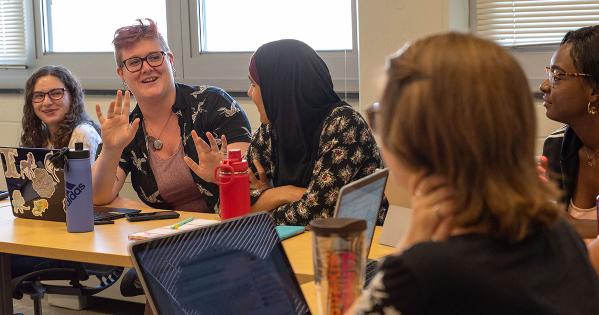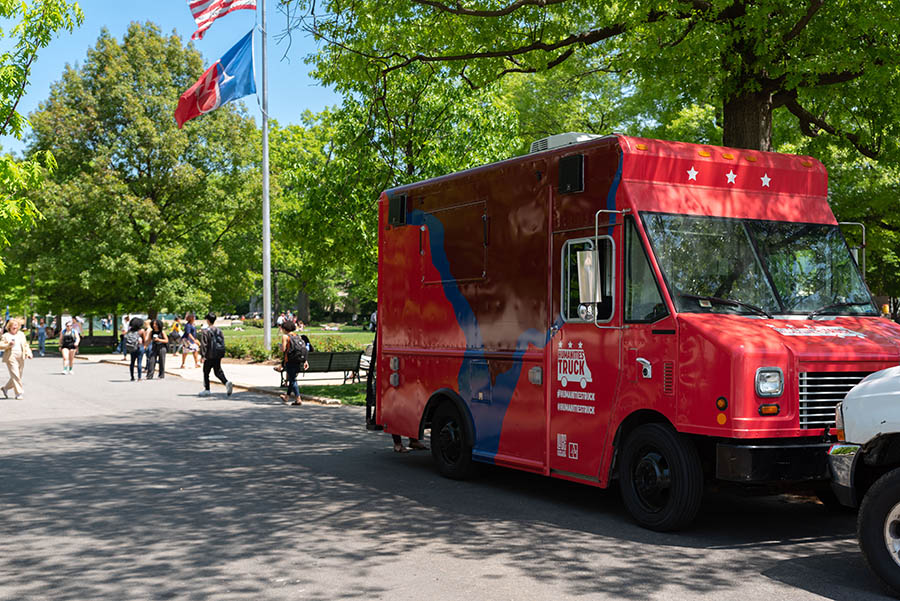Our Top Tips for Applying to Grad School

It’s application season! It’s exciting, but it can also be a bit nerve-wracking. The College of Arts and Sciences understands that graduate school is a big decision, and that the application process can sometimes seem overwhelming. To help out prospective candidates, we reached out to Jonathan Harper, assistant director of graduate recruitment, to ask him what advice he has for students who are thinking of applying to graduate programs in AU’s College of Arts and Sciences.
Here are his top tips:
1. Identify Your Goals and Choose the Right Program
So now you’ve identified your academic and professional goals, and you’ve determined what you want to study in graduate school. But your work is not done. Harper recommends doing lots of research on individual programs and departments within your universities of interest. You want to get the most out of your graduate experience, and that starts with finding a good fit. Does the program line up with your goals? How about your values? Harper says that a major part of the application process is compatibility—do you have the right foundation for this program? Are your strengths and goals compatible with the program, the faculty, the research focus? “You are a unique applicant,” Harper says. “Each program is also unique. We want to go into this knowing how well we will work together.”
Did you know
CAS offers more than 50 graduate degrees and certificates in the humanities, arts, sciences, and social sciences. Each program reflects our philosophy that a combination of academic training and real-world professional experience is the best preparation for success as a leader in your field.
2. Choosing a Program of Study: Do Your Homework

Remember that when you’re applying to graduate school, you are not just applying to American University. You are applying to a specific program with its own individual criteria, requirements, and deadlines, and you must be prepared. Be sure to review the program’s website carefully for applicant requirements and deadlines, which may include your resume, personal statement, essays, transcripts, and test scores.
3. Get Organized: Start Early
Harper advises creating a spreadsheet with the requirements and deadlines from each program you are considering. That way nothing will catch you by surprise. Also, Harper suggests making sure all your applications are ready to go two weeks in advance. That way, if anything goes wrong, you’ll have plenty of time to fix it!
One insider CAS tip from Harper is that the College needs to submit application forms early, before you need to submit your other documents. So complete your application first, and as early as possible!
Did you know
All applications submitted by our priority deadlines are automatically considered for graduate funding. This includes tuition remission, stipends, and/or research assistantships!
4. Choose Your References Carefully

The best references can talk about your ability to succeed in your chosen field of study. “You want to use someone who can confirm that you have the foundational skill and intellectual curiosity necessary for your program,” Harper says. It doesn’t need to be your current supervisor; it’s okay to reach out to a previous professor or boss and update them about what you’ve accomplished since you last saw them. “And if possible, sit down and talk with them in person,” he adds.
5. Use Holistic Writing Samples
“If your application requires a writing sample, it should present a holistic view of who you are as an academic,” Harper advises. Faculty reviewers use these to not only assess your writing and research skills, but also your interests. Choosing an academic paper on a subject you feel passionate about will help us understand you better and help faculty see how you fit in with their own research specialties.
Did you know
AU averages 14 students per graduate class.
6. Reach Out and Connect
If you have additional questions, the CAS Graduate Enrollment Marketing (GEM) office is one of your best resources. You can talk to them about individual programs, applications issues, or anything else you might need. Also, if possible, join one of GEM’s events (held in person, regionally, and virtually), and check out its calendar for upcoming events that can give you an insider’s view of CAS graduate programs.
*New on-campus, online, and regional events are added throughout the year, so check back frequently.
